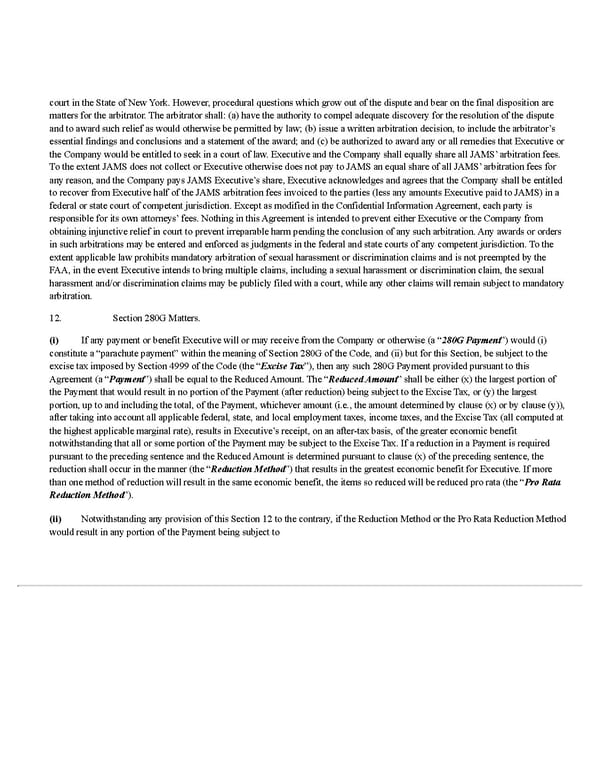court in the State of New York. However, procedural questions which grow out of the dispute and bear on the final disposition are matters for the arbitrator. The arbitrator shall: (a) have the authority to compel adequate discovery for the resolution of the dispute and to award such relief as would otherwise be permitted by law; (b) issue a written arbitration decision, to include the arbitrator’s essential findings and conclusions and a statement of the award; and (c) be authorized to award any or all remedies that Executive or the Company would be entitled to seek in a court of law. Executive and the Company shall equally share all JAMS’ arbitration fees. To the extent JAMS does not collect or Executive otherwise does not pay to JAMS an equal share of all JAMS’ arbitration fees for any reason, and the Company pays JAMS Executive’s share, Executive acknowledges and agrees that the Company shall be entitled to recover from Executive half of the JAMS arbitration fees invoiced to the parties (less any amounts Executive paid to JAMS) in a federal or state court of competent jurisdiction. Except as modified in the Confidential Information Agreement, each party is responsible for its own attorneys’ fees. Nothing in this Agreement is intended to prevent either Executive or the Company from obtaining injunctive relief in court to prevent irreparable harm pending the conclusion of any such arbitration. Any awards or orders in such arbitrations may be entered and enforced as judgments in the federal and state courts of any competent jurisdiction. To the extent applicable law prohibits mandatory arbitration of sexual harassment or discrimination claims and is not preempted by the FAA, in the event Executive intends to bring multiple claims, including a sexual harassment or discrimination claim, the sexual harassment and/or discrimination claims may be publicly filed with a court, while any other claims will remain subject to mandatory arbitration. 12. Section 280G Matters. (i) If any payment or benefit Executive will or may receive from the Company or otherwise (a “ 280G Payment ”) would (i) constitute a “parachute payment” within the meaning of Section 280G of the Code, and (ii) but for this Section, be subject to the excise tax imposed by Section 4999 of the Code (the “ Excise Tax ”), then any such 280G Payment provided pursuant to this Agreement (a “ Payment ”) shall be equal to the Reduced Amount. The “ Reduced Amount ” shall be either (x) the largest portion of the Payment that would result in no portion of the Payment (after reduction) being subject to the Excise Tax, or (y) the largest portion, up to and including the total, of the Payment, whichever amount (i.e., the amount determined by clause (x) or by clause (y)), after taking into account all applicable federal, state, and local employment taxes, income taxes, and the Excise Tax (all computed at the highest applicable marginal rate), results in Executive’s receipt, on an after-tax basis, of the greater economic benefit notwithstanding that all or some portion of the Payment may be subject to the Excise Tax. If a reduction in a Payment is required pursuant to the preceding sentence and the Reduced Amount is determined pursuant to clause (x) of the preceding sentence, the reduction shall occur in the manner (the “ Reduction Method ”) that results in the greatest economic benefit for Executive. If more than one method of reduction will result in the same economic benefit, the items so reduced will be reduced pro rata (the “ Pro Rata Reduction Method ”). (ii) Notwithstanding any provision of this Section 12 to the contrary, if the Reduction Method or the Pro Rata Reduction Method would result in any portion of the Payment being subject to
 Q1 2022 10Q Page 58 Page 60
Q1 2022 10Q Page 58 Page 60